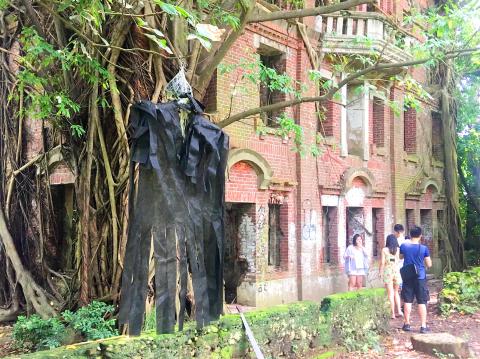Voted the nation’s best haunted mansion in a poll on Yahoo Taiwan, the Liu family mansion in Chiayi County has had even more visitors this month, the seventh month of the lunar calendar, or Ghost Month.
According to traditional Chinese beliefs, spirits of the dead are released into the mortal realm during Ghost Month. Every day, offerings to these spirits can be observed on almost any street.
The Liu mansion in Minsyong Township (民雄) was built during the Japanese colonial era, but it was abandoned shortly after being completed, making way for many ghost stories.

Photo: Tsai Tsung-hsun, Taipei Times
According to a local myth, the owner had an affair with a maid, who, after being abused by the wife, drowned herself in the mansion’s well.
Another tale says that a Japanese soldier killed himself when staying the night, while others say there were “unmistakable” occult disturbances when the Chinese Nationalist Party (KMT) army set up camp near the mansion.
A visitor, surnamed Ho (何), said that he was starting off Ghost Month — which this year began on Thursday last week — by visiting haunted houses, and that he traveled from Taichung to Minsyong because the Liu mansion is the most famous.
Ho said that the overgrown Baroque-style ruins have an eeriness to them, but he did not feel scared.
“But it might be because I visited in the morning,” he added.

Alain Robert, known as the "French Spider-Man," praised Alex Honnold as exceptionally well-prepared after the US climber completed a free solo ascent of Taipei 101 yesterday. Robert said Honnold's ascent of the 508m-tall skyscraper in just more than one-and-a-half hours without using safety ropes or equipment was a remarkable achievement. "This is my life," he said in an interview conducted in French, adding that he liked the feeling of being "on the edge of danger." The 63-year-old Frenchman climbed Taipei 101 using ropes in December 2004, taking about four hours to reach the top. On a one-to-10 scale of difficulty, Robert said Taipei 101

Nipah virus infection is to be officially listed as a category 5 notifiable infectious disease in Taiwan in March, while clinical treatment guidelines are being formulated, the Centers for Disease Control (CDC) said yesterday. With Nipah infections being reported in other countries and considering its relatively high fatality rate, the centers on Jan. 16 announced that it would be listed as a notifiable infectious disease to bolster the nation’s systematic early warning system and increase public awareness, the CDC said. Bangladesh reported four fatal cases last year in separate districts, with three linked to raw date palm sap consumption, CDC Epidemic Intelligence

Two Taiwanese prosecutors were questioned by Chinese security personnel at their hotel during a trip to China’s Henan Province this month, the Mainland Affairs Council (MAC) said yesterday. The officers had personal information on the prosecutors, including “when they were assigned to their posts, their work locations and job titles,” MAC Deputy Minister and spokesman Liang Wen-chieh (梁文傑) said. On top of asking about their agencies and positions, the officers also questioned the prosecutors about the Cross-Strait Joint Crime-Fighting and Judicial Mutual Assistance Agreement, a pact that serves as the framework for Taiwan-China cooperation on combating crime and providing judicial assistance, Liang

US climber Alex Honnold left Taiwan this morning a day after completing a free-solo ascent of Taipei 101, a feat that drew cheers from onlookers and gained widespread international attention. Honnold yesterday scaled the 101-story skyscraper without a rope or safety harness. The climb — the highest urban free-solo ascent ever attempted — took just more than 90 minutes and was streamed live on Netflix. It was covered by major international news outlets including CNN, the New York Times, the Guardian and the Wall Street Journal. As Honnold prepared to leave Taiwan today, he attracted a crowd when he and his wife, Sanni,